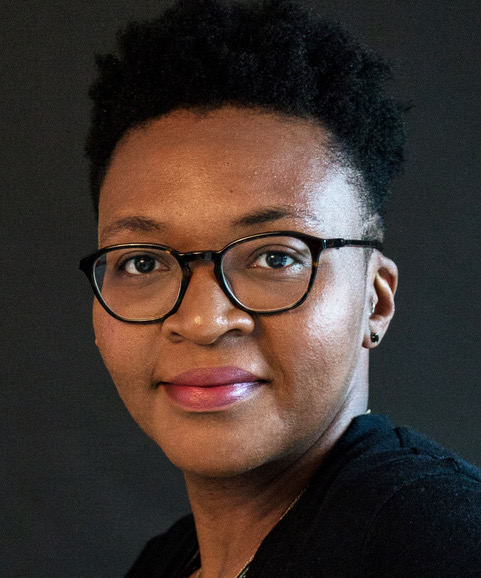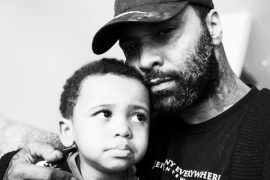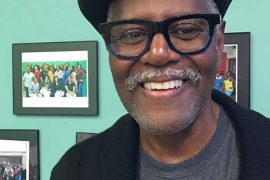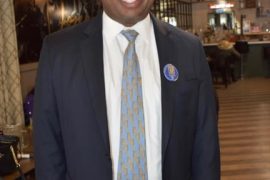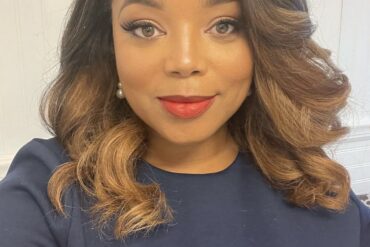As a playwright, tv writer, screenwriter, educator, and all-around creative, the prolific Christina Anderson is known as an artist’s artist.
Her award-winning plays such as How to Catch Creation, pen/man/ship, Man in Love, and Good Goods have appeared at Chicago’s Goodman Theatre, the Oregon Shakespeare Festival, Yale Repertory Theatre, Kansas City Repertory, and numerous other theatres across the United States and Canada.
In addition to creating her work, Anderson has also found time to share her creative knowledge with younger generations, having taught playwriting at several prestigious institutions such as the David Geffen School of Drama, Wesleyan University, Rutgers University, SUNY Purchase College, and Brown University.
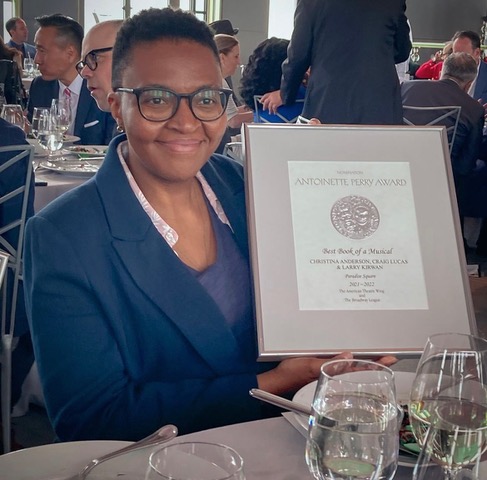
Anderson was nominated for a 2022 Tony Award for Outstanding Book of a Musical for Broadway’s Paradise Square.
N’DIGO recently sat down with the multi-hyphenate artist to talk about her discovery of writing, her most recent play, “the ripple, the wave” that carried me home, and her beat-making alter ego, Purely Magenta.
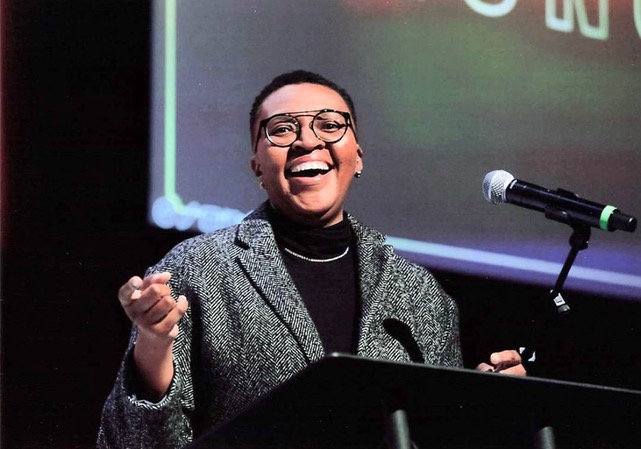
In your own words, who is Christina Anderson?
Christina Anderson: She’s an artist. A human being, A Black woman living and making and creating in the 21st century. A Black queer woman living, making, and beginning in the 21st century. I am a daughter. I am a partner, a teacher, a mentor, a friend, a beatmaker, a music lover, and a sneakerhead, and I am left-handed. I’m just somebody who’s trying to survive in these times and document the things I see around me.
What were your early childhood dreams of your future occupation?
As a kid, I never knew how I would do this thing that I’m doing now. I always knew I was going to be a writer. I wanted to be a writer. I wanted to write. But I never had a sense of what that path would look like. I just always knew I would try to make room for it in my life to write and create. I decided when I was 16 that I would write for the theater for the rest of my life, and I didn’t know what that would look like. I assumed I would have a day job doing something completely different in a different field – probably law or education – or something to that effect. But I was going to write as much as I could at dawn, in the evenings, or at night, and then have this completely separate day job life. That’s probably how I thought it would all work out when I was younger. But I’ve been fortunate that all my work as an adult is in some way about theater or making or creating, so I’ve been fortunate in that respect so far.
How did you discover your artistry and knack for writing?
My mother supported my reading and constantly gave me books as I was growing up as a kid. And I remember her reading to me a lot. I think because I was surrounded by all this reading and books and material, it inspired me to try for myself. I was also an only child, so I grew up with a lot of cousins and stuff around me, but there were a lot of times when I was doing my only child thing and making up worlds and creating stories and trying to figure out ways to realize the things I was imagining. So, I think it was two-fold. I think I was surrounded by really cool reading material when I was a kid – I remember Ramona Quimby, Age 8, Encyclopedia Brown, and all this children’s literature. And when I got older, I was still too young to be reading it. I read a lot of Terry McMillan in middle school; somebody snuck in a mama’s copy, they brought it to school, and it circulated around the school, and I remember reading that when I was like 14, and also Walter Dean Myers’ Motown and Didi. So, I think that my discovering of writing was through being inspired by other people who had done it, and their books kind of made their way to me.
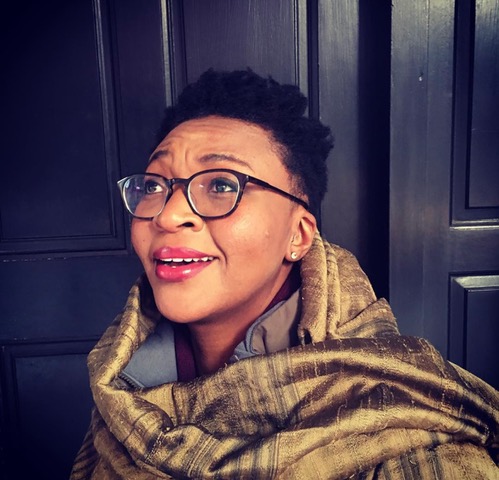
Who are some writers you remember discovering and being inspired or influenced by?
I was coming up in the 90s, with its explosion of a very particular style of Black cinema and storytelling, like A Different World and Living Single and Boyz n the Hood and Love Jones, and the Love Jones soundtrack. I think it was a genuine cinematic and visual time with many music videos and Missy Elliott. So, it was just a lot of ways I was consistently inspired by things I was looking at and listening to. I remember VIBE magazine. I got a subscription to it for my birthday, and many of the photo shoots in that magazine were inspiring. And Waiting to Exhale, when it came out as a movie, I think that was a really great time because visually, there was a lot of interest in showing the beauty of Black folks and how they were shot on film. Even when I look back now, a lot of ways those music videos are shot, they kind of lean into the opulence of things. But, they also consider lighting and how Black folks’ skin tones looked on screen. So, I think that also influenced my writing in the sense that, even though I may write a complicated character who explores complicated topics, there’s still a part of me that wants to celebrate the beauty of Blackness and the culture of Blackness in America. So, I think that period of the 90s definitely inspired me; along with Terry McMillan, and Ntozake Shange, I discovered Nikki Giovanni and Toni Sanchez were huge. Black Feminist Thought by Patricia Hill Collins I read when I was a senior in high school, and that changed everything for me in terms of considering Black women navigating the culture here in this country. So, that changed a lot for me as well.
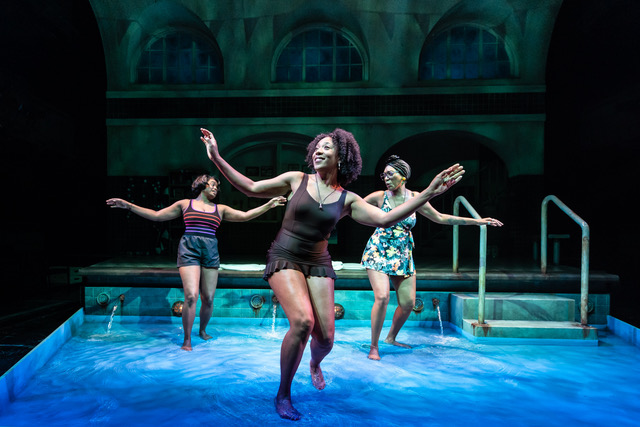
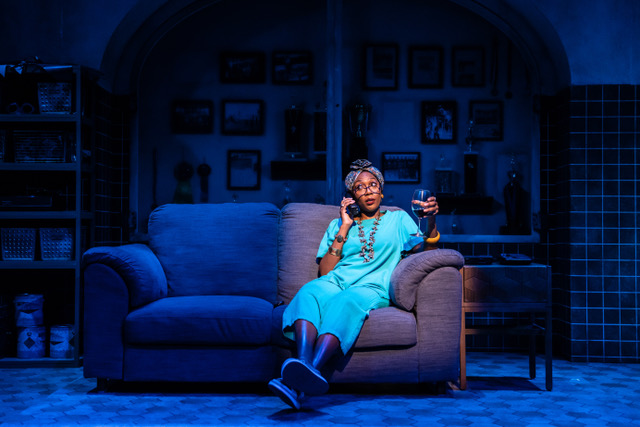
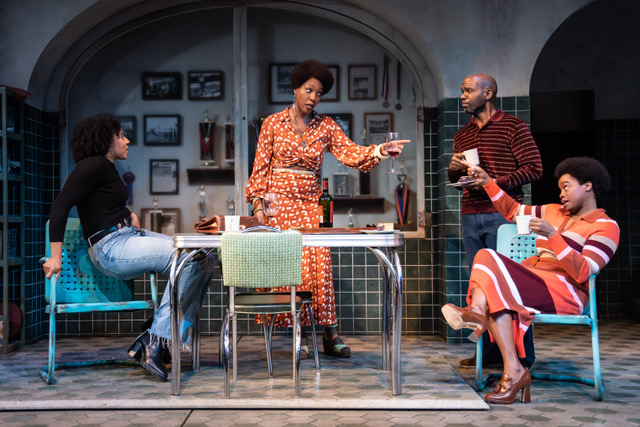
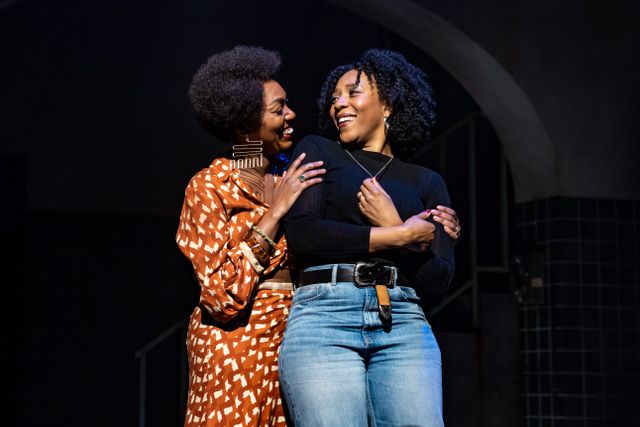
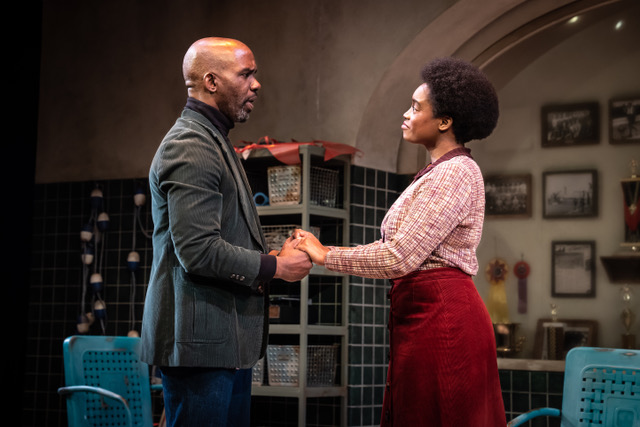
Please tell us about your latest work, “the ripple, the wave that carried me home.”
I’m super excited about the production…the cast is killing it. Very thankful to Jackson Gay, who’s the director and was able to really create a beautiful production. The play focuses on Janice, a Black woman in her 30s, living in Ohio with her family. She gets a call from her hometown in Beacon, Kansas, that they want to name the indoor swimming facility after her father, Edwin Collin, who I like to call an aquatic activist. We learn over the course of the play the activism and the activist work that they did to try to get Black folks access to swimming facilities in Beacon, Kansas. And so, over the course of the play, when Janice gets this phone call to come speak at the ceremony – her father has passed away at this point – it kind of forces her to think back over her childhood and the memories of being the child of activist parents. The play also talks about the history of swimming in her city and how their being denied access created further complications within the family. It’s a play that kind of looks at political inheritance. Then it also looks at family dynamics and some of the things that activists sacrifice when they’re doing this work for the greater good – the personal sacrifices that can come up.
Your work usually covers and tackles very tough subjects but is entertaining at the same time. Do you feel, as an artist that, is the best way to open dialogue and get people to talk about these things?
I don’t know if it’s the best way. It’s the way I have found to satisfy these things that I want to talk about and the things that I want to see on stage. They do kind of gravitate toward more serious subjects, but at the same time, I also just want to try to tell a good story. And for me, at least, in telling a good story, you have to have a lot of different elements. So, there’s humor; there’s compassion, sometimes there’s anger, sometimes there’s sadness, just like in all the ways we live our lives. There can be incredibly dark times. And even in those dark times, there may be a moment or flash of beauty. Or, there may be a moment or flash of humor. And so, I try to, as much as I can, kind of capture how life is very complex, and you can have one thing that rests against another thing. And so, I try to put that on stage as much as I’m capable. I don’t know if it’s the best way to open dialogue, but it’s the way that I gravitate; the way I tell these stories is through that.
Do you have a unique routine or regimen that you follow when it’s time to write?
Yes, I would say my unique routine or regimen is wallowing when it’s time to write. I do a bunch of research before I sit down to write on any project, so I’m reading a bunch of stuff, watching a bunch of stuff, and listening to a bunch of stuff. And then usually, I try to figure out who are the immediate people in the world I’m going to be engaging with in the piece or who’s going to be in the piece, and usually, I try to have a sense of what is the thing, like why are they showing up when they show up – did something happen, did something change, did they lose something, did something break, did something get fixed? There usually has to be a reason why I want to start telling their story. Once I have all those elements in place, usually, the routine is, “Okay, I’ve got to start writing this.” There’s a lot of wallowing. I spend time picking fonts in Microsoft Word, and then I usually try to start as simply as possible. So usually, the first word or the first sentence is just like kind of cleaning the table. That’s usually what I do in the first sentence. Oftentimes it’s just blackness, so it’s a black stage, a black screen, and then I just slowly try to build the world from that point on. But usually, it’s just a lot of wallowing and thinking and hand-wringing. That’s probably the unique routine that I have.
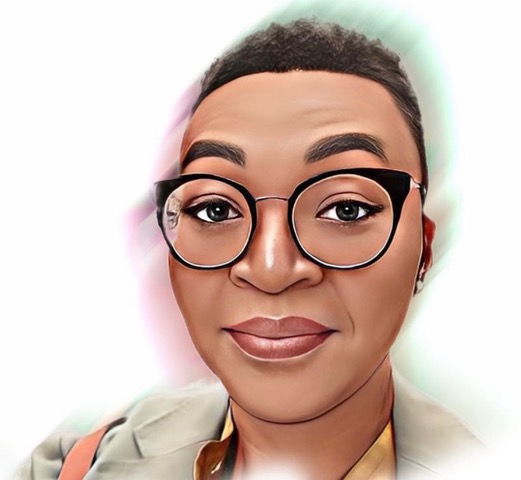
Who is Purely Magenta?
Thank you for asking! Purely Magenta is my moniker as an aspiring beatmaker and hip-hop instrumentalist. I’ve always been interested in hip-hop and making beats. When I was a kid, I remember looking in the back of Source Magazine and seeing those MPCs being a ton of money and knowing I’d never be able to get one as a kid and my mother would never be able to get me one. So, funny enough, the last time I was at the Goodman working on How to Catch Creation, I had Add-2, who came in as a rap consultant, to work with two of the performers on the cast who had to freestyle some of the lyrics and then also, there’s a character named Riley, who one of the many things she does is she makes beats. And so Add-2 came in, and he worked with the two performers to kind of create some freestyles, and he also brought in his beat machine. And I hadn’t realized how much technology had advanced since I was a teenager looking through Source Magazine. And I also didn’t realize how horrible a lot of the prices had gotten. So in 2018, 2019, I got my first beat machine and then the pandemic hit, and like a lot of folks, the theater had shut down, and a lot of the projects I was working on had come to a halt. I was sitting at home and really just kind of dove in to learn machines, to learn music production and I just started making these beats.
The name Purely Magenta was inspired by a line from the Golden Girls when Blanche talks about the color Magenta being “you’re not really jealous, you’re not really sad, you’re not really mad, and you’re not really happy. It’s just all these emotions that are kind of mixed up.” So, Purely Magenta is me because I feel like when I’m making the music, sometimes I’m making happy beats. My partner calls my sadder beats my “funeral marches.” The music-making process for me is an expression of a lot of different emotions sometimes. That’s Purely Magenta.
What’s something people would be surprised to know about you?
A lot of people know I’m a huge Barbra Streisand fan and a huge Judy Garland fan. I love karaoke. That might be something that could be surprising. And I miss it. I haven’t done it since the pandemic so I miss karaoke. My go-to songs are Disco Inferno, and Raspberry Beret; I love that song so much. Also, Kris Kross‘ Jump and definitely 100% some ABBA. Maybe those are some things people would be surprised by.
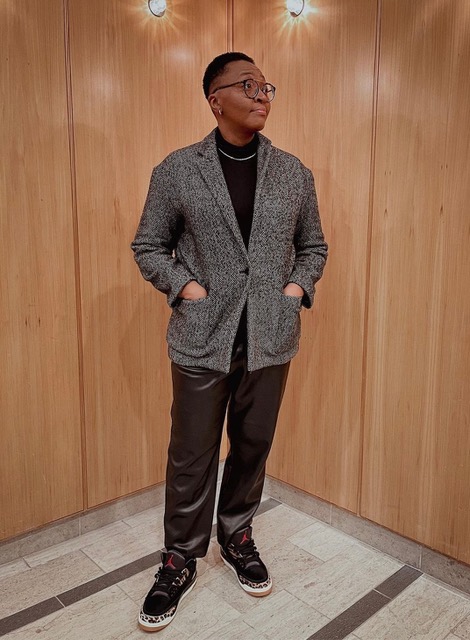
Best advice to aspiring writers and artists/creatives in general?
I would say reading is probably the thing. I think before I would have said consuming a bunch of stuff and watching a bunch of stuff, but that’s not an issue because there’s so many products and TV shows and films and other arts to consume. But, I would say slowing down and reading and carving out the time to slow down if you can, have an actual book in your hand. But if not, download an app on your phone. And also, I would probably say trying to do one thing. So, if you’re listening to a podcast, just listen to that podcast or if you’re reading, shut off your notifications and read. Try to do one thing and focus which is also why I enjoy beat making because a lot of times when I’m working on it, I’m just making the beat and not really focusing on being distracted by anything else.
So, that would probably be my advice to an aspiring artist. Try to pick a time when you’re doing one thing instead of multitasking or the potential of being distracted by something. Go to a museum and be present with the art and sounds that are coming to you in that museum. Have an experience and feel like you don’t have to take a picture of it and document it. Just try to check in with yourself, with all your senses, and be present in the moment. Particularly for theater, because it’s so ephemeral, you are constantly in that present moment when you’re watching theater. I think it’s also important for artists to experience that as much as possible – being present. I’m not saying it’s easy. It’s tricky for me sometimes. But, I try to be purposeful in that.
Favorite quote or affirmation?
I think it’s Crunk Feminist who says “Just because I’m new to you doesn’t mean I’m new to this.” That’s one of my favorite quotes. I think my 2023 affirmation is “Sail and not rowing.” That’s the thing I’m doing now, trying to figure out in my life the ways I can just kind of let the wind guide me instead of trying to force things to be a certain way.
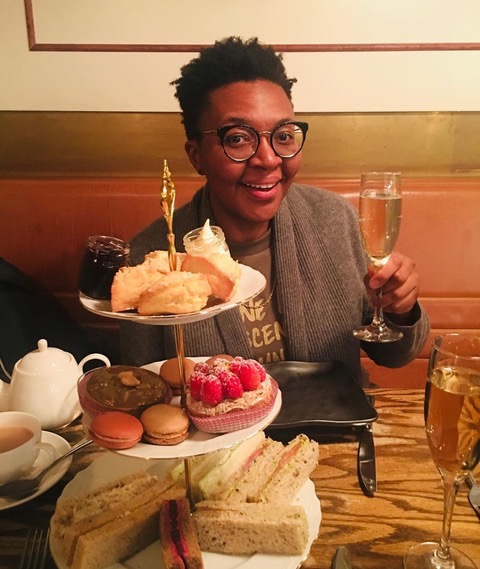
What’s next for Christina Anderson?
I’m working on a stage adaptation of Barracoon, the Zora Neale Hurston book that came out a few years ago. I’m also hoping to make an album this year….just kind of an independent thing. I have a couple of ideas for some things, for some albums, so hopefully, I’ll find the time to make an album this year. I’m on SoundCloud @Purely Magenta if you want to follow that. I also have a couple of pilots in the works. Hopefully, I can sit down and really kind of flesh out some TV pilot ideas that I have. But ultimately, the goal for 2023 is to keep making and always to find the next level, the next step in a lot of this creative work that I’m doing. That’s the ultimate goal.
“the ripple, the wave that carried me home“, recently finished a successful run at the Goodman Theatre. For more information on Christina Anderson, please visit www.christinaandersonwriter.com


